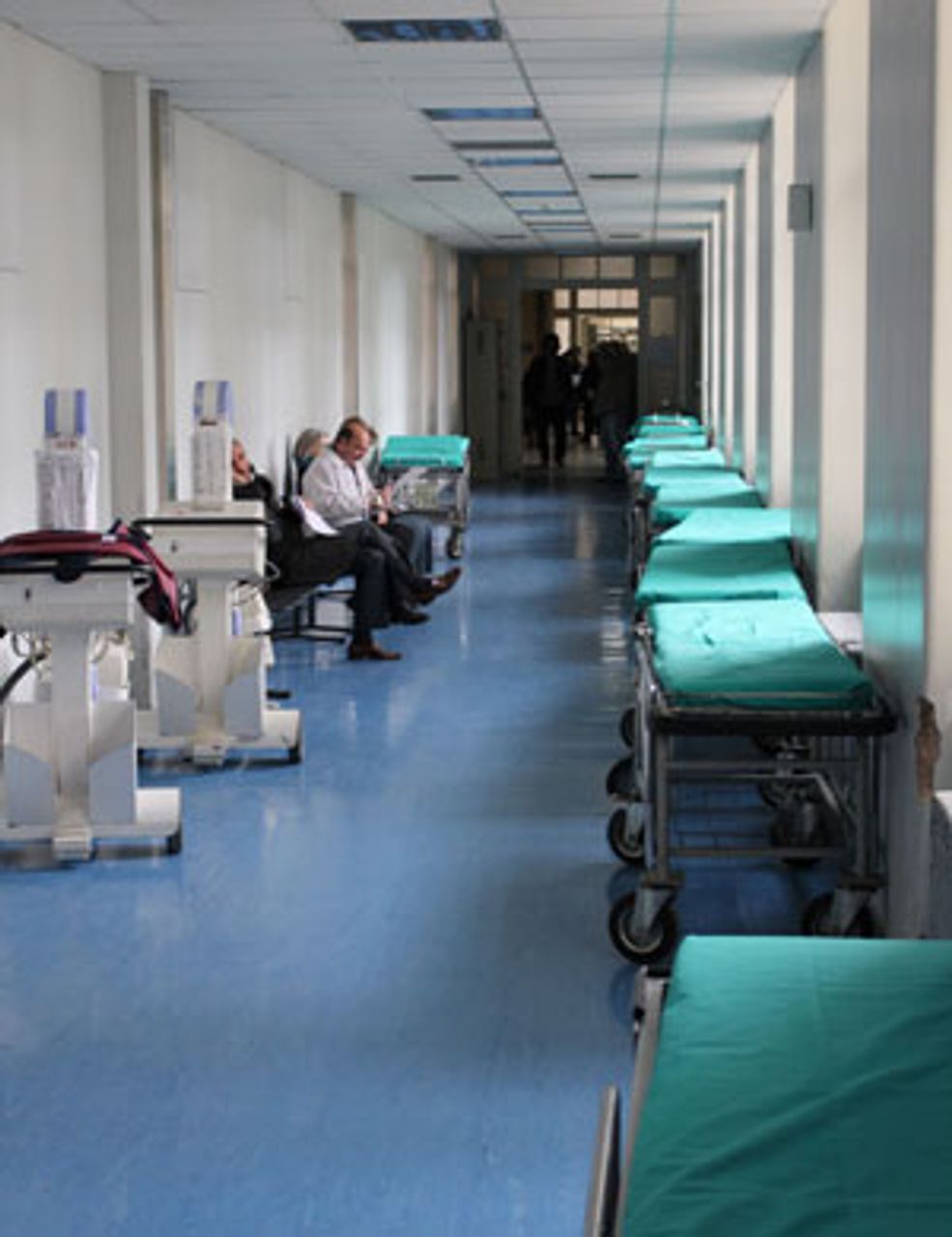Par nos correspondants
19 mars 2012
Le parlement grec a adopté le 1er mars des réductions massives dans le service de santé public.
La réduction d’un milliard d’euros des dépenses de santé était la dernière loi intérieure requise en vertu de la liste de « mesures préalables » imposées par l’Union européenne, le Fonds monétaire international et la Banque centrale européenne pour permettre à la Grèce d’obtenir le second prêt de 130 milliards d’euros.
Ces mesures comprennent l’allongement des horaires d’ouverture des pharmacies, la réduction des dépenses de médicaments par les fonds de pension publics et une législation qui rend obligatoire la prescription de médicaments génériques.

A l’intérieur de l’hôpital de la Croix Rouge à Athènes
Les coupes ont entraîné de vastes protestations de la part du personnel hospitalier. La veille du vote, les travailleurs des hôpitaux publics avaient organisé une grève de 24 heures. On a vu dans tout Athènes, avant le vote, une affiche collée devant les pharmacies et sur laquelle le ministre de la Santé, Andreas Loverdos, était présenté comme un fossoyeur.
Les avancées sociales obtenues au cours de plusieurs décennies ont été anéanties du jour au lendemain. Commentant les réductions, le journalAthens News a déclaré, « La priorité du gouvernement, qui dépense quelque 25 milliards d’euros par an pour la santé, grosso modo 10 pour cent de son PIB, est de contrôler un système public de santé gonflé. »
Ces dernières réductions viennent s’ajouter aux souffrances qui affligent d’ores et déjà des millions de gens suite aux attaques déjà perpétrées par le précédent gouvernement PASOK en 2009.
En octobre dernier, le World Socialist Web Site signalait [article en anglais uniquement] une étude publiée par la revue médicale The Lancet, intitulée « Santé publique : la crise financière, une tragédie grecque. »
En raison des réductions budgétaires, 40 pour cent de la population grecque sont obligés de se passer de services médicaux. Un phénomène sans précédent dans l’Union européenne qui a fait que des organisations non gouvernementales telles Médecins du Monde procurent des services médicaux courants à la population.
Le président de la section grecque de Médecins du Monde, Nikitis Kanakis, a décrit la situation comme étant « une crise humanitaire qui continue de s’aggraver. »
Une équipe de reporters du World Socialist Web Site a parlé cette semaine aux travailleurs hospitaliers. Au service de chirurgie de l’hôpital de la Croix Rouge à Athènes, dans le quartier d’Ambelokipi, le personnel a expliqué que la crise économique avait eu pour conséquence une pénurie de matériel. Les travailleurs de la santé craignent que des projets soient en train d’être élaborés qui résulteraient dans la privatisation de l’hôpital alors même que la majorité des gens n'ont pas les moyens d'avoir accès à des soins médicaux privés. Un hôpital attenant a déjà été privatisé et ses employés sont maintenant rémunérés différemment et ont des contrats différents de ceux du personnel de la Croix Rouge d’Athènes.
Maria travaille à l’hôpital depuis 22 ans et supervise le service de chirurgie. Elle a dit, « Il y a eu pas mal de baisses de salaires. Avec la prime que je reçois et avec 22 ans de service, mes revenus se situent maintenant à 1.200 euros par mois. En raison des réductions, c’est 500 euros de moins que ce que je percevais avant. Ici, la plupart des travailleurs ne gagnent qu’entre 500 et 700 euros par mois »
Une grand nombre d’infirmières employées à l’hôpital sont issues de centres de formation professionnelle et n’ont pas de diplôme universitaire. Maria a expliqué que la plupart de ces dernières ne gagnaient maintenant pas plus de 640 euros, soit entre 300 et 400 euros de moins que ce qu’elles gagnaient avant.
Les infirmières travaillent 40 heures ou plus par semaine. Si les infirmières travaillent de nuit, la rémunération supplémentaire n’est que de 10 euros par équipe de nuit. « Une infirmière a travaillé huit nuits en décembre et n’a gagné que 90 euros de plus, » a dit Maria.
Le manque de personnel a conduit à une situation où seules deux infirmières travaillent de nuit et sont responsables d'une quarantaine de patients à l’hôpital. Maria nous a dit qu’elle s’attendait à de nouvelles suppressions de postes à l’avenir.
Demny a expliqué, « Lorsque j’ai débuté comme infirmière il y a deux ans, je gagnais 980 euros. Maintenant, en raison des réductions de salaire, je ne perçois plus que 560 euros et j’ai une petite fille à charge. »
Un phénomène croissant en Grèce est le fait que des enfants sont obligés de se faire aider matériellement par leurs parents alors que ces derniers éprouvent eux-mêmes des difficultés à joindre les deux bouts. Demny a expliqué qu’elle se sentait humiliée parce qu’elle n’était plus en mesure de pourvoir à ses besoins et qu’elle avait dû envoyer sa fille vivre chez ses parents. « A une époque j’envoyais de l’argent à mes parents pour les aider et maintenant c’est eux qui m’envoient de l’argent, » a-t-elle dit.
Demny a dû réduire toutes ses dépenses ordinaires vu que le loyer de son appartement coûte à lui seul plus de 300 euros par mois. « Il ne me reste même pas 40 ou 50 euros à la fin du mois et je ne pense que cela va s’améliorer. Je pense que ça va s’empirer, » a-t-elle dit.
Malgré cette situation, Demny ne veut pas quitter son emploi parce que le chômage est tellement élevé et qu’elle bénéficie encore du statut de fonctionnaire.
A la question de savoir si elle avait un message à faire passer aux lecteurs du World Socialist Web Site Maria a dit, « Je souhaite que la situation en Grèce n’arrive pas aux autres travailleurs en Europe. »

On voit les effets terribles de la calamité sociale qui s’est abattue sur la Grèce dans l'état grave, entre la vie et la mort, des patients qui viennent pour se faire soigner à l’hôpital a dit Vissaria, doctoresse qui travaille depuis un an à la Croix Rouge. « Nous nous trouvons maintenant dans une situation en Grèce où les gens viennent aux urgences des hôpitaux lorsqu’ils sont à deux doigts de la mort. »
« Ce que je veux dire, c’est qu’ils ne vont pas voir un médecin privé à cause des frais. Maintenant, ils ne vont voir un médecin que quand ils sont sérieusement malades. Lorsqu’ils ont quelque chose qu’ils jugent bénin, ils ne vont pas voir un médecin privé. En Grèce si vous allez chez un médecin privé vous devez débourser 40 euros par visite. Et donc, quand elles viennent ici certaines personnes sont dans un état très, très grave.
« Il y a des gens qui viennent ici qui ont perdu leur emploi, des gens qui n’ont pas mangé depuis longtemps, des gens qui sont seuls et malades et qui ne peuvent recevoir d’aide de nulle part. Nous avons des personnes âgées qui ont des enfants mais les enfants n’ont maintenant plus l’argent pour soutenir leurs parents et leurs procurer des soins de santé.
« Nous avons beaucoup de problèmes ici. Nous avons de moins en moins de matériel médical. Nos salaires sont beaucoup plus bas qu’avant. Mon salaire a été réduit de 300 euros par mois. Nous avons dû tout restreindre. Nous arrivons à payer nos factures mais il n’y a plus d’argent pour rien d’autre. »
(Article original paru le 15 mars 2012)
http://www.wsws.org/francais/News/2012/mar2012/grec-m19.shtml


